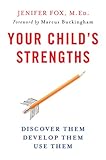The underlying philosophy in most of the school systems I’ve encountered (growing up and as a parent, with one notable exception) seems to be based on the assumption that a student’s greatest opportunities for growth are in his areas of weakness.
Obviously students do need to develop their skills in areas where they don’t demonstrate their strongest aptitude. You can’t just say “math is not this student’s strength, so he’s not going to study math.”
Yet it would be wrong to infer from this that the educational system should focus most attention on improving a student’s weakest areas. For this takes focus away from sharpening and building the student’s strengths, which are where the greatest potential for growth lies.
One reason focusing on strengths results in the greatest growth is because it is motivating. People like to do what makes them feel strong (the definition of a strength — note, a strength is not merely what you are good at), and so they are intrinsically motivated to do it more. Thus, they get better at it, and the cycle continues. Further, this cycle has “spillover effects.” By getting better at something, your general sense of self-efficacy improves (note: that is very different from self-esteem), and you become better at other things as well.
Focusing on weaknesses, on the other hand, is demotivating. As someone has very rightly said, “if you focus on someone’s weaknesses, they lose confidence.” This can backfire entirely, such that the student not only fails to grow significantly in their weak areas, but also ends up being frustrated with their educational growth all together.
Usually I’m thinking about how strengths-based thinking applies in the workplace. But as our oldest child is now in the middle of first grade, my wife and I are beginning to think hard about what strengths-based thinking means for their education.
The above are some of the ways we’ve begun to think about how to take a strengths-based approach to educating our children. But being in the midst of a school system that seems to have the opposite approach, we’re on the lookout for good resources to help us develop our thinking on this. Which is why we were so glad to recently come across this book:
Your Child’s Strengths: Discover Them, Develop Them, Use Them
Here’s the review from Publisher’s Weekly:
Fox, head of a girl’s boarding school in New Jersey, writes about a strengths-based curriculum she developed and implemented with great success. She not only presents a workbook that can be utilized by educators and parents, but also offers a convincing argument in favor of over-turning outdated curriculums and teaching methods. Instead of focusing on weaknesses, Fox submits that children do far better when the focus is on their strengths. Childhood is for “creative dreaming,” not preparation for standardized tests. Fox identifies three types of strengths: activity, learning and relationship strengths, and helps parents guide their children toward self-discovery, explaining that true strengths include not only what a child is good at, but what she enjoys and makes her feel strong. The book is written in a lively and engaging style, and sprinkled with anecdotes from Fox’s teaching life and her own experiences as a student who was frustrated and uncomfortable in a traditional school setting. Clearly, writing is one of Fox’s strengths, as is her inspiring passion for helping kids lead meaningful lives.
